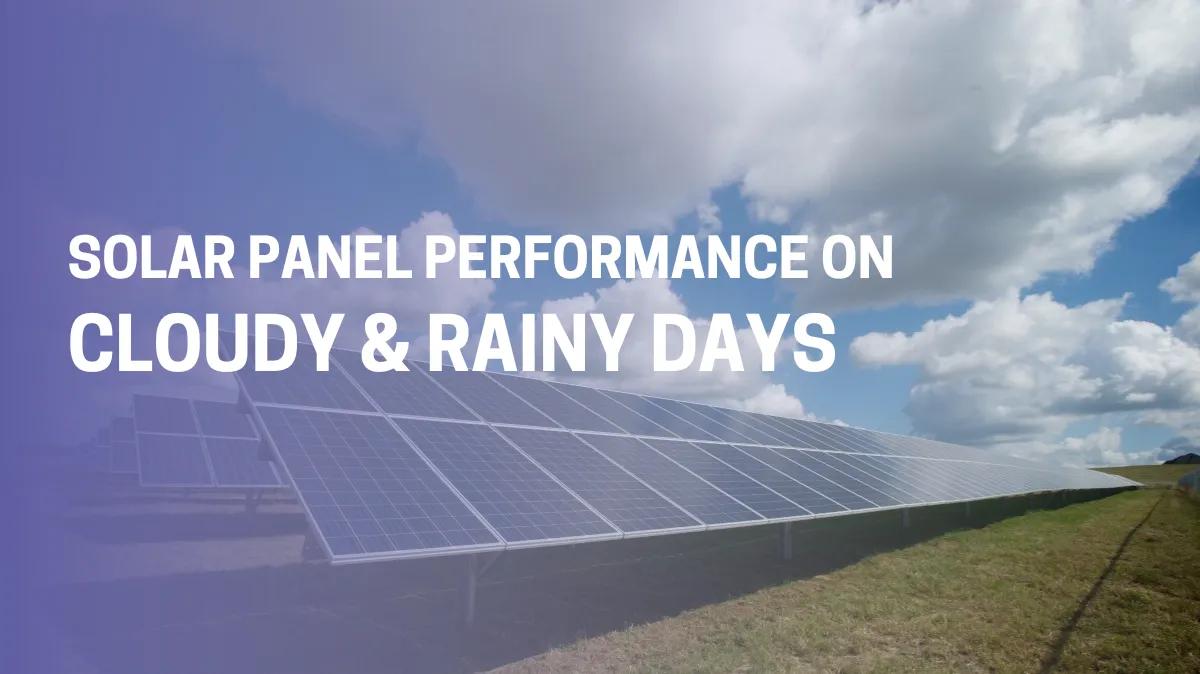Do Solar Panels Work On Cloudy, Rainy Days, & At Night?
By: HomeOtter Team
Mar 28th 2023
Time: 10min
More and more people are giving solar power a big thumbs up, especially the environmentally conscious types who think solar power is the best way to a sustainable environment. All this while saving big bucks on their electricity bills. But many are often found pondering over questions like do solar panels work in cloudy weather or are they any good during the rainy season?
If you've had moments like these where you've glanced up at the cloudy sky and thought, "Well, there goes my solar power for the day”, this guide will dispel any myths and answer all your questions. Alongside that, we will also talk about common issues related to solar panels working in these conditions.
We promise you a clearer understanding of the factors that impact the performance of solar panels before you finish that cup of joe. You will also learn about the ways to optimize your solar panels’ performance on cloudy and rainy days and at night.
But before we begin discussing the effects of weather on solar panel efficiency, it's important to understand how they work. Let’s take a look.
How Do Solar Panels Work? A Detailed Look Into Solar Energy Generation
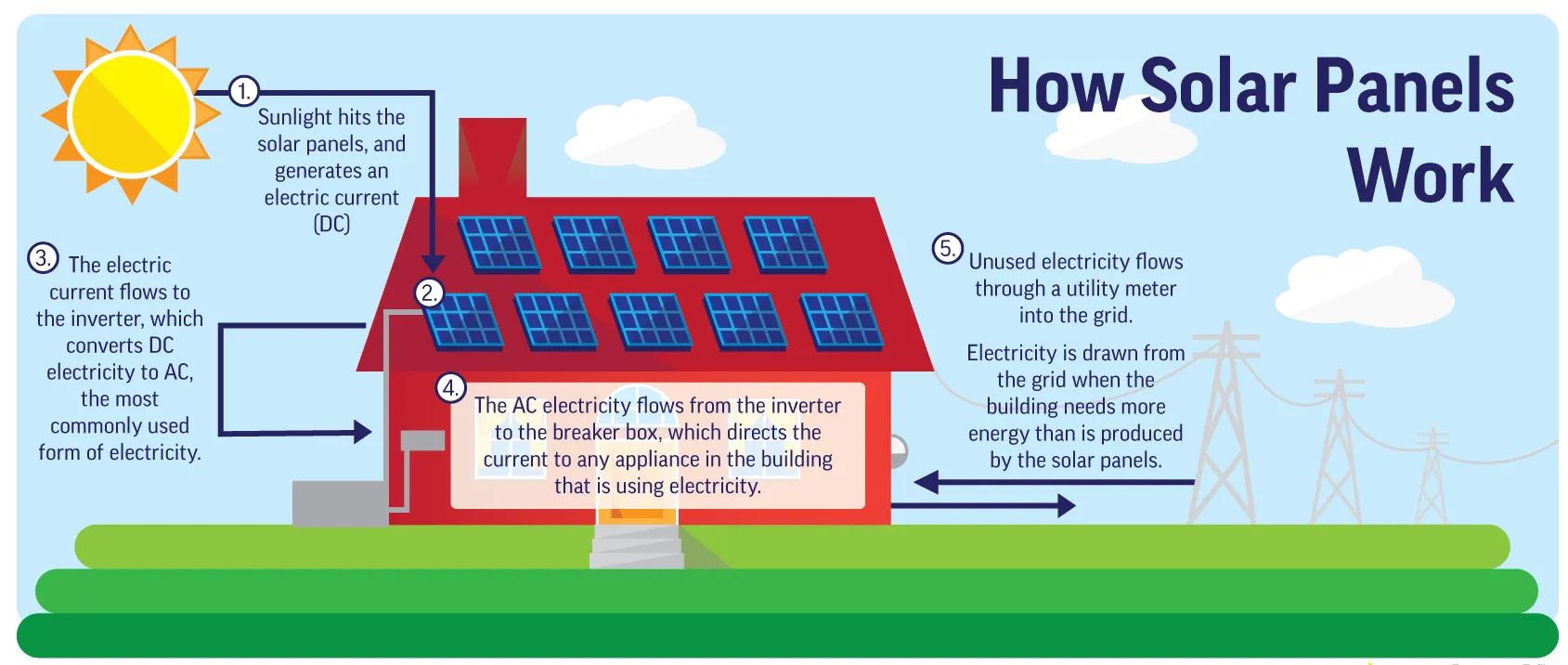
Despite the ever-increasing popularity of this renewable energy source, most people don’t know exactly how solar panels work. Let’s find out.
Main Solar Panel Components
For starters, this is what the main components of a typical solar panel comprise of:
- Solar Panels - made up of solar cells that convert sunlight into electricity
- Glass - sandwiches the solar cells and protects them from the elements
- Inverter - converts the direct current (DC) produced by the solar panels into alternating current (AC) that's usable
- Mounting Structure - secures the solar panels to your roof or the ground
- DC Disconnect Switch - allows you to turn off the DC power supply to your solar panel system
- AC Disconnect Switch - will enable you to turn off the AC power supply to your home or business
- Electrical Meter - measures the electricity your solar system produces and the electricity you consume
- Electrical Panel - distributes the electricity produced by your solar panel system to your home or business
- Batteries (optional) - store excess electricity produced by your solar panel system for use when the sun isn't shining
But before anything else, it is important to know how the actual discovery of the photovoltaic effect shaped the future of solar panels that we know today.
Understanding The Photovoltaic Effect On Solar Panels
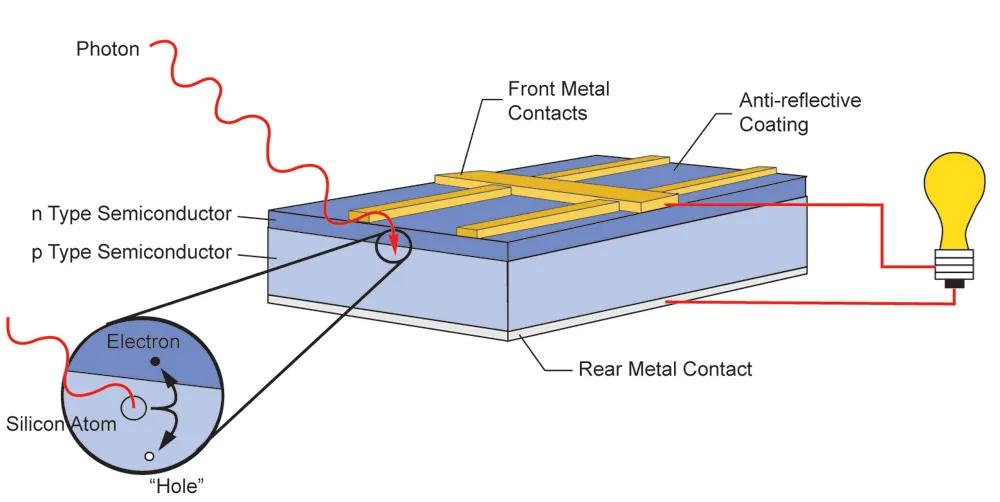
The generation of electric current and voltage by solar cells, when exposed to sunlight, is commonly labeled as the photovoltaic effect. Let's all raise a toast to French physicist Alexander Edmond for his important discovery in the 19th century. He found that certain materials, like silicon, would produce an electric current when exposed to light.
So let's begin with the existence of photons, shall we? Photons happen to be tiny particles the light is made up of. So when a photon hits a solar cell, power games begin. Photon being more powerful, knocks and frees an electron from one of the atoms in the cell. This electron is then free to move around, and when captured by a wire, it is used to produce electricity.
How Energy Is Produced Through Solar Panels?
So how exactly does a solar panel system produce electricity? It all starts with the sun, solar panels, and the tiny particles aka the photons in the sun’s rays. The light from the sun hits the solar panel, the cells in the panel absorb some of the photons in the light, and voila the magic begins.
This creates an electric current that flows through the wires in the panel. This current is then sent to an inverter, which converts it from DC to AC which is the type of electricity that we use in our homes.
Now that we know how solar panels produce electricity, let’s discuss their performance during cloudy days.
How Do Cloudy Days Impact The Performance Of Solar Panels?
Let's explore the impact of cloudy days on solar panel performance and how to maximize your solar system power output.
The Effect Of Clouds On Solar Panels
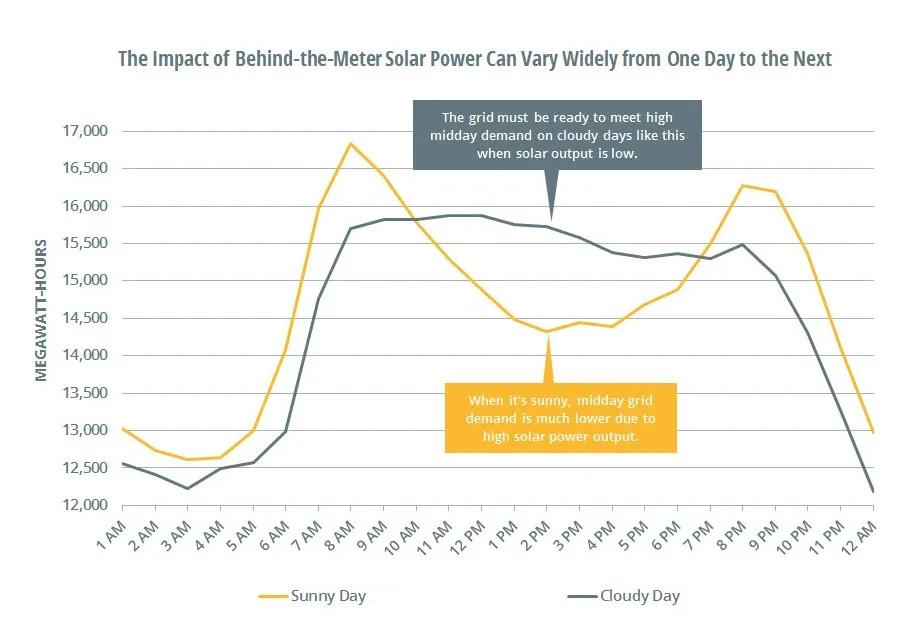
Cloudy with a chance of “solar panel malfunctioning”? Yes, maybe, definitely! When it comes to solar panel performance, it is true that clouds become a major factor that affects its efficiency. This is because solar panels require sunlight to produce energy. The more sunlight that reaches the panels, the more energy they produce.
Clouds can impact solar panels in a few ways. To start, they decrease the amount of direct sunlight that hits the solar panels directly, which in turn reduces the amount of energy the panels generate.
Second, clouds can cause diffused light. It is the light that’s been scattered in different directions by the clouds. This type of light is less efficient for solar panels to use, as it has a lower energy level than direct sunlight. So even when you still argue about the presence of sunlight on a cloudy day, the solar panels may not agree with you and won’t work as happily as they would on a bright sunny day.
The extent to which clouds affect solar panel performance depends on a few different factors.
The type of cloud is one – thicker clouds will block more sunlight than thin clouds. As the strength of the sun's rays weakens, it becomes obvious that solar panels will produce less energy. The strength of photons in light matters.
The angle of the panels can also affect how much energy they produce, as panels that are tilted towards the sun will receive more direct sunlight than those that are not.
While clouds can reduce solar panel performance, they don't completely eliminate it. Solar panels can still work on cloudy days and the amount of energy they produce will depend on the factors mentioned above.
Then some solar panels are made to do their job efficiently even in low light circumstances. So producing sufficient energy even when it's cloudy or raining is not a big deal for such systems.
How Much Energy Is Produced On Cloudy Days?
Precisely speaking, the production of the energy is dependent on the cloud thickness and the type of solar panel you have. While a thin layer of clouds reduces solar panel performance by 10-25%, a heavy layer of clouds can reduce it by up to 80%.
Innovative Solutions For Maximizing Solar Energy Production On Cloudy Days
Innovative solutions are available to maximize solar energy production even on cloudy days. Time to delve deeper into it.
I. Invest In High-Efficiency Solar Panels
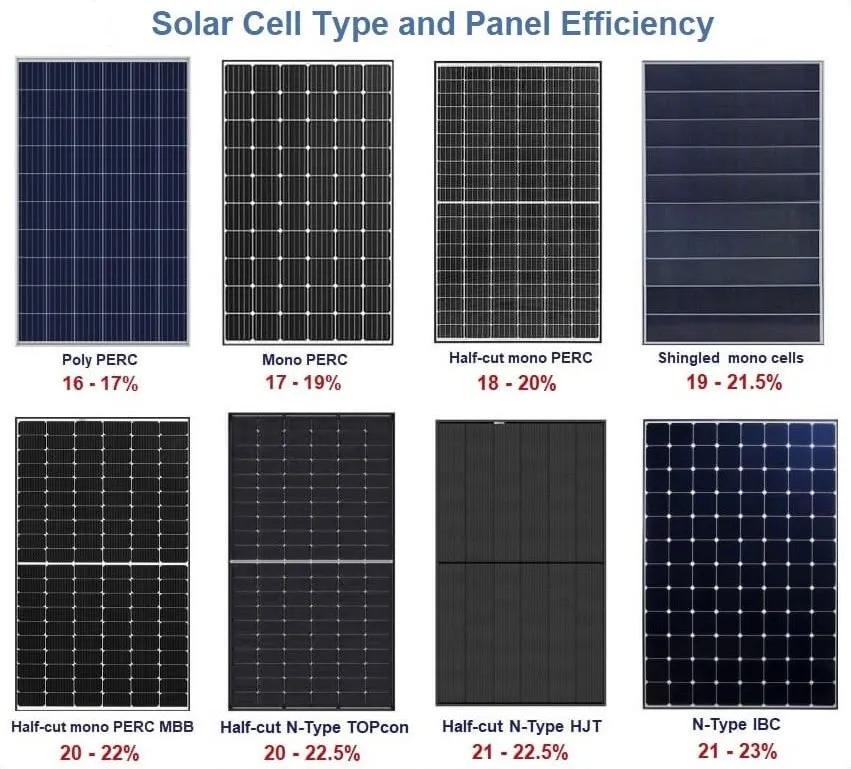
One solution is to invest in high-efficiency solar panels. These types of panels are specifically designed to produce more energy even in low light conditions than their conventional counterparts. This means that even on cloudy days, they can still generate a significant amount of excess power. If you are open to long-term good investment, we suggest getting high-efficiency solar panels.
We at HomeOtter know the struggle of finding high-efficiency solar panels and that's why we're here to help – we make finding the best high-efficiency solar panels a breeze. Our partner solar companies provide high-efficiency panels that generate up to 30% more energy than their average counterparts.
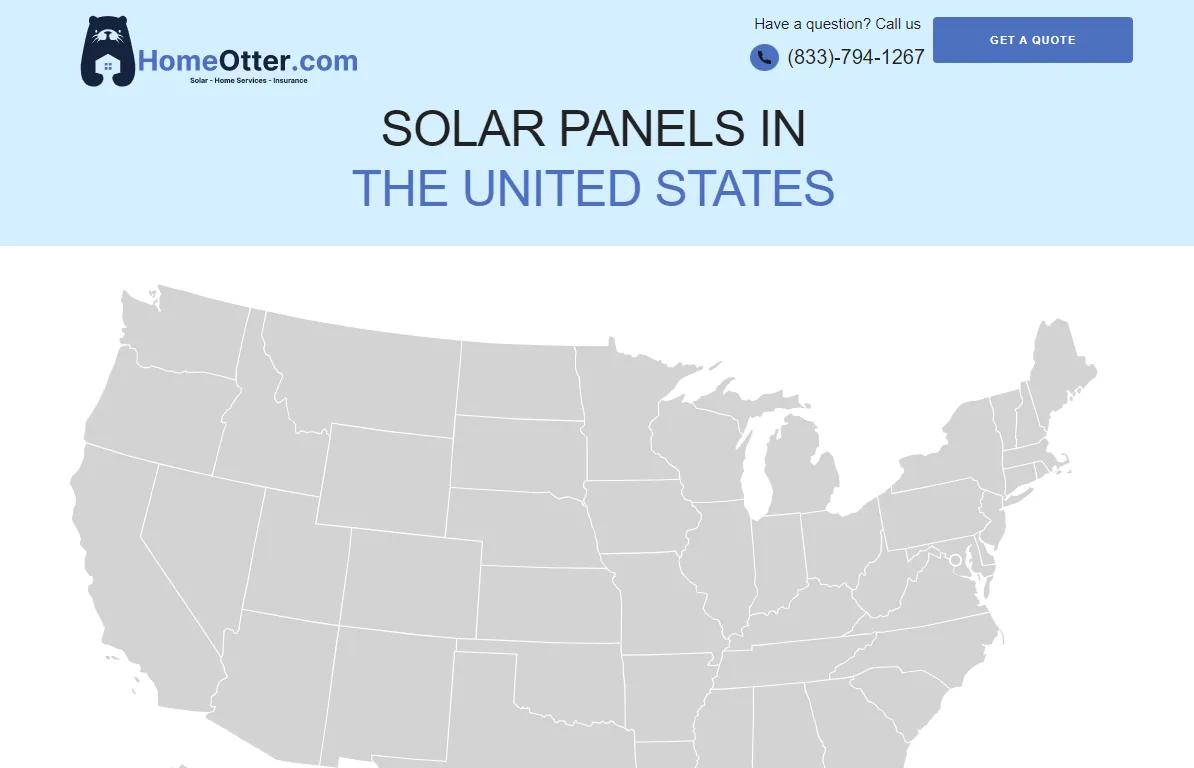
Now if you are thinking about the damage it will cause to your wallet, that's where our online solar report will come in handy. In just under 4 minutes, you can get a free customized solar report from HomeOtter that suggests the size of the solar unit you need as well as a cost-benefit analysis. But here's the best part - our report only includes the highest-quality, most efficient solar panels on the market.
II. Install A Solar Tracking System
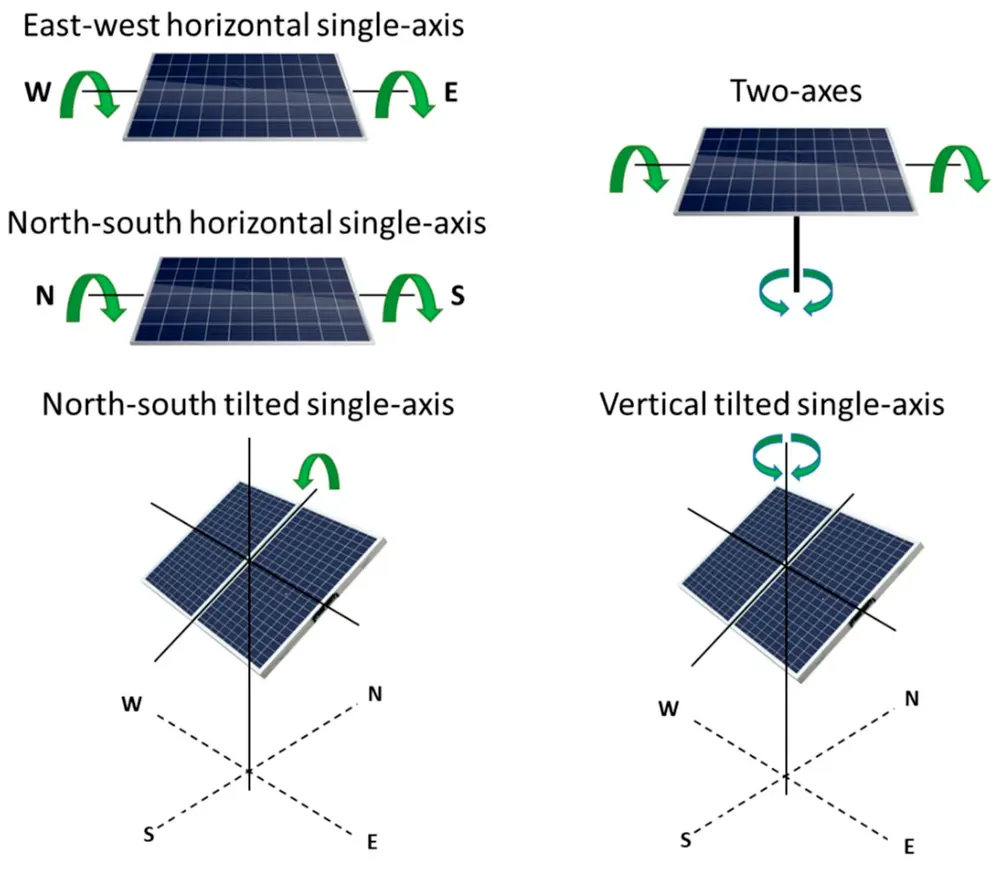
Another solution is to install a solar tracking system. A solar tracking system follows the movement of the sun and adjusts the angle of the solar panels to maximize the amount of sunlight they receive.
This would help solar panels still generate ample amounts of energy however cloudy it may be. Solar tracking systems can be particularly useful in areas where clouds are common, as they help to maximize energy production throughout the day.
III. Consider A Battery Backup System
A battery backup system can also be a useful solution for maximizing solar energy production on cloudy days. These systems store excess power generated by your solar system during sunny periods which can be used on cloudy days. This ensures that your home continues to receive power even when the sun is not shining.
Then we have the issue of power outages. This is where battery backup systems can particularly come in handy as they provide a reliable source of backup power.
IV. Invest In Micro-Inverters Or Power Optimizers
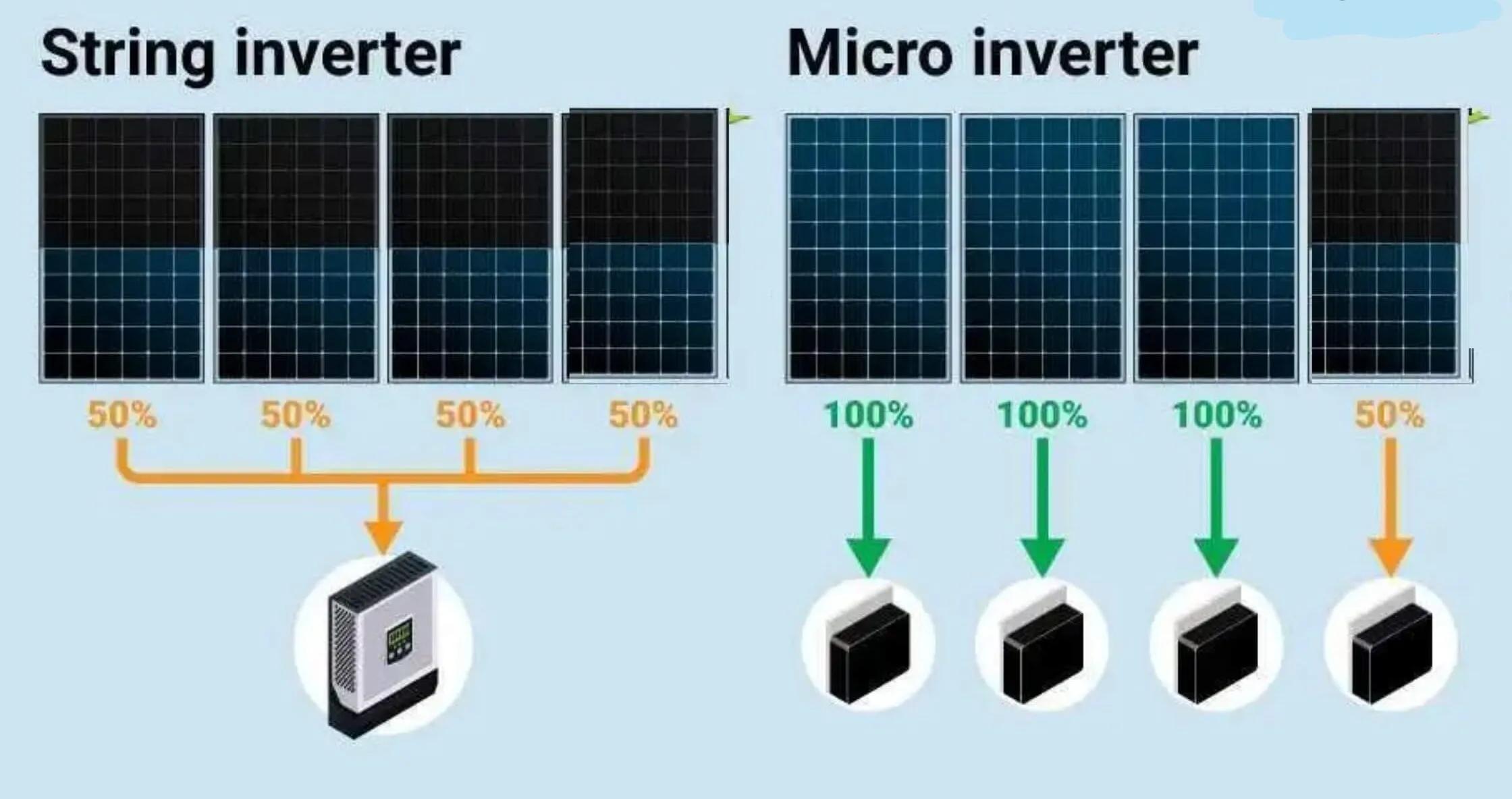
Another innovative solution for maximizing solar energy production on cloudy days is to invest in micro-inverters or power optimizers. Micro-inverters are attached to each panel to convert its power. So even if one panel is shaded, the others will continue to produce solar energy at an optimal level.
Power optimizers are installed between solar panels and the inverter. They perform functions such as maximum power point tracking and voltage regulations to ensure that each panel is operating at its maximum power point and mitigates the effects of shading or uneven panel performance.
Optimizing the performance of each panel, micro-inverters and power optimizers can help to maximize energy production even on cloudy days.
Now that we know how clouds affect solar panel output, let’s see what rain does to them.
How Do Rainy Days Impact The Performance Of Solar Panels?
One of the most common concerns that people have is how rainy weather affects solar panels. Let's take a closer look.
The Effect Of Rain On Solar Panels
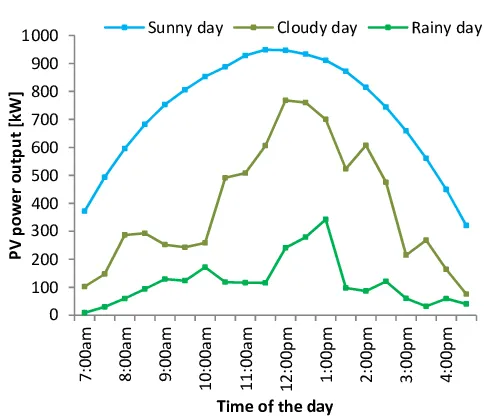
Rain has a significant impact on the performance of solar panels but it’s not all bad news. In fact, rain can actually help to clean solar panels, washing away dirt, dust, and debris that may have accumulated over time which improves the overall output of the panels.
However, the intensity of the rain and the thickness of the cloud cover significantly reduce the power that solar panels produce. Heavy rain can block out sunlight and reduce the amount of solar radiation that reaches the panels.
The angle and orientation of the solar panels also impact their efficiency on rainy days. If the panels are positioned at an angle that allows rainwater to collect on them, it will build up dirt and debris. On the other hand, if the panels are angled to run off rainwater easily, they are less likely to experience an obstruction, and their efficiency will be less affected by rainy weather.
How Much Energy Is Produced On Rainy Days?
On rainy days, solar panels produce even less energy than on cloudy days. Yes, you heard that right and this is because the rain clouds are typically thicker and more opaque than regular clouds, blocking out even more sunlight and reducing the amount of solar radiation that reaches the panels.
On a rainy day, solar panels may only produce around 5-10% of their maximum energy output.
Innovative Solutions For Maximizing Solar Energy Production On Rainy Days
Innovative solutions help to optimize energy production even on the rainiest of days. Here are some of the most promising ones:
A. Get Hybrid Solar Panels
Hybrid solar panels are a relatively new technology that has been designed to generate energy from both sunlight and raindrops. These specialized panels have a coat of special hydrophobic material on them that repels water while sliding it off the surface of the panel.
As the rainwater slides off the panel, it generates a small amount of electrical energy which is then collected and stored in a battery. Even though the amount of energy produced from rainwater is relatively small, it can still make some major difference on rainy days, quite literally.
B. Consider Bifacial Solar Panels
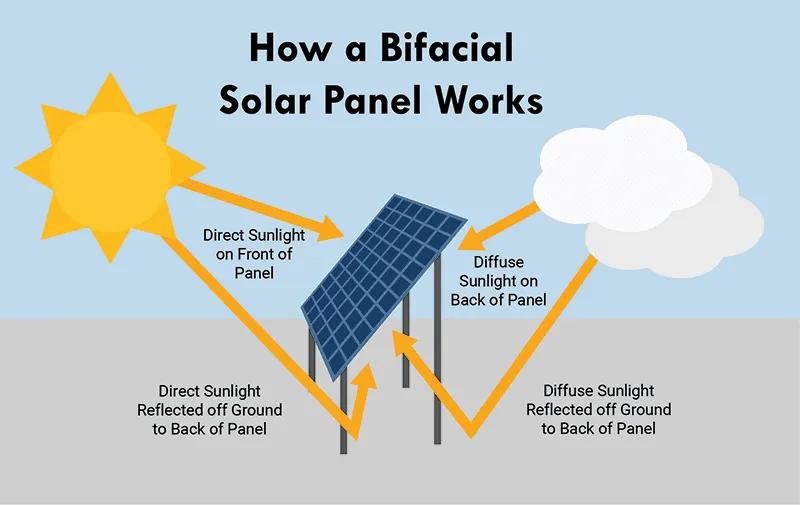
Bifacial solar panels are another innovative solution that can help to maximize solar energy production, even on rainy days. These panels are designed to capture sunlight from both the front and back of the panel, allowing them to generate electricity from both direct and reflected sunlight. They produce energy even when the sun is not shining directly on the panel.
Bifacial solar panels have a layer of transparent glass on the back which captures light that passes through the front of the panel. This allows them to generate energy from reflected light, such as light that is reflected off of the ground or other nearby surfaces.
While bifacial solar panels are more expensive than traditional solar panels, it's totally worth the money for people living in areas where there is a lot of diffuse light or where the weather is often cloudy or rainy.
C. Use Reflective Coatings
Here comes another innovative solution for maximizing solar energy production on rainy days. These reflective coatings are designed to reflect indirect sunlight onto the panels from surrounding surfaces, such as walls or the ground, increasing the amount of light that the panels receive. This helps solar panels capture more sunlight even on rainy days.
Now that we are familiar with solar panel performance during rain, let’s see how effective they are at night.
How Does Night Time Impact The Performance Of Solar Panels?
Now comes another critical question - what happens to solar panels at night? Does the lack of sunlight affect the performance of solar panels? Let’s discuss this.
How Much Energy Is Produced During Night Time?
Solar panels are not a 24/7 energy source. The biggest downside of solar panels – they only work during the day when there is sunlight. Therefore, at night, solar panels do not produce any energy. No sunlight means no knocking the electrons off the atoms in the photovoltaic cells, and hence no flow of electricity.
Innovative Solutions To Benefit From Solar Energy During Night Time
Let’s now take a look at some innovative solutions that you can use to benefit from solar energy during nighttime.
1. Invest In Thin-Film Solar Cells
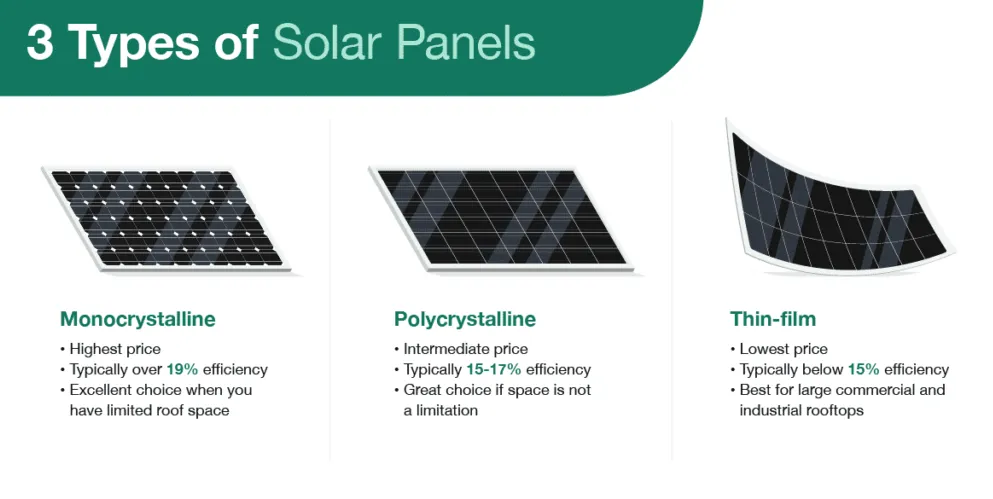
Thin-film solar cells are a newer technology that can be used to maximize solar energy production during the night. The semiconducting materials used in them are only a few micrometers thick. This gives them more flexibility and they become more lightweight than traditional solar cells.
Additionally, they are more efficient in low-light conditions, making them an ideal solution for generating power at night from the moonlight – of course when there is some.
2. Use Energy Storage Systems
Use batteries to store excess solar energy during the day and then release it at night when solar panels are not generating power. Off-grid homes or businesses that rely solely on solar power can particularly benefit from this arrangement.
3. Use Solar Trackers
Solar trackers are devices that track the movement of the sun and then adjust the panel position accordingly to maximize solar energy production. They can also come in handy at night to track the moon and stars. This way, solar trackers optimize the position of the solar panels and ensure they are in the best position to capture any available light.
Conclusion
The technological advancements in the solar panel industry have enabled us to put sunlight to better use, even on days when it's hiding behind clouds or rain.
And with all these scientists constantly researching new materials and technologies to make solar panels even more efficient, the day isn't far when you’ll have the definite answer to do solar panels work in cloudy weather. Who knows, in a few years, we might be able to get 100% output from solar panels to power our homes and businesses, rain or shine - or at night.
At HomeOtter, we connect you with solar companies providing the most state-of-the-art solar panel solutions that work well on cloudy and rainy days. We don't partner with average companies providing average solutions.
We at HomeOtter scrutinize each solar panel company to the core and only suggest the ones that have made their name in the market for superior quality infrastructure and services. So why wait?
Get started today by requesting an online customized solar report from HomeOtter and let us help you find the best solar panel solutions that won’t leave you high and dry during cloudy and rainy weather.
